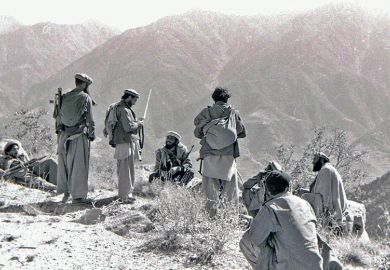The Egyptian Islamist movement known as the Muslim Brotherhood continues to divide opinions. Some observers consider the movement a moderate Islamist trend; others believe it to be a gateway to jihadi violence. This divided assessment is also evident in the limited research on its relationship with the West.
Many analysts view the Brotherhood as inevitably antagonistic to the West, given its history and rhetoric as a movement emerging under British colonial rule in Egypt in the 1920s. Others suggest that both the movement and Western governments are pragmatic and willing to engage in dialogue and even cooperate with each other. From conspiracy theories stating that British agents created the Muslim Brotherhood as a conservative Islamist movement to defeat anti-imperialist Arab nationalists to recent right-wing assertions about secret connections between the Obama administration and the Brotherhood, there are several myths that urgently need to be dismissed about an ambiguous relationship.
Martyn Frampton traces the history of engagement between the West and the Muslim Brotherhood since the rise of the movement in 1927 with a view to dismissing the myths and conspiracy theories. The book is divided into two parts. The first traces the engagement and enmity between the British colonial government and the Egyptian Muslim Brotherhood (1928-52). During this period, many British ambassadors deemed the movement inherently antithetical to British interests, and the British press described it as consisting of fanatical young men. But this negative assessment did not stand in the way of liaisons during the Second World War, which led to what Frampton calls a “best of enemies” relationship in the post-war period. This section narrates a complex and detailed chronology of confrontation and liaisons between the British, the Egyptian government and the Brotherhood.
As British rule over Egypt ended in 1952, a new era of Western interventions was ushered in with the attempt of the United States to establish its own hegemony in the Middle East. Like the previous British colonial power, the US could not ignore the activities, rhetoric and strategies of the Muslim Brotherhood, by now one of the most prolific Islamist trends not only in the Arab world but also across other Muslim countries, and since the 1970s in the West itself. In the book’s second part, Frampton traces how the US dealt with the Brotherhood between 1952 and 2010. Like their UK counterparts, US diplomats adopted a policy that tries to identify “moderates and foster moderation as counter-currents to extremism”.
The West and the Brothers will continue to have a complex relationship. To explain that relationship, one must go beyond the rhetoric of a modernising secular West and a conservative anti-modern Islamist trend. Frampton provides ample evidence to suggest that collision may not be inevitable, showing how it can give way to engagement and dialogue.
The book is dense and full of interesting material. Its primary audience is specialists, as those with limited knowledge of the region might drown in the rich historical details of intricate relationships and intrigues.
Madawi Al-Rasheed is visiting professor at the Middle East Centre, London School of Economics, and the editor of Salman’s Legacy: The Dilemmas of a New Era in Saudi Arabia (forthcoming).
The Muslim Brotherhood and the West: A History of Enmity and Engagement
By Martyn Frampton
Belknap/Harvard University Press, 672pp, £25.95
ISBN 9780674970700
Published 23 February 2018
POSTSCRIPT:
Print headline: Cooperation and confrontation
Register to continue
Why register?
- Registration is free and only takes a moment
- Once registered, you can read 3 articles a month
- Sign up for our newsletter
Subscribe
Or subscribe for unlimited access to:
- Unlimited access to news, views, insights & reviews
- Digital editions
- Digital access to THE’s university and college rankings analysis
Already registered or a current subscriber?







